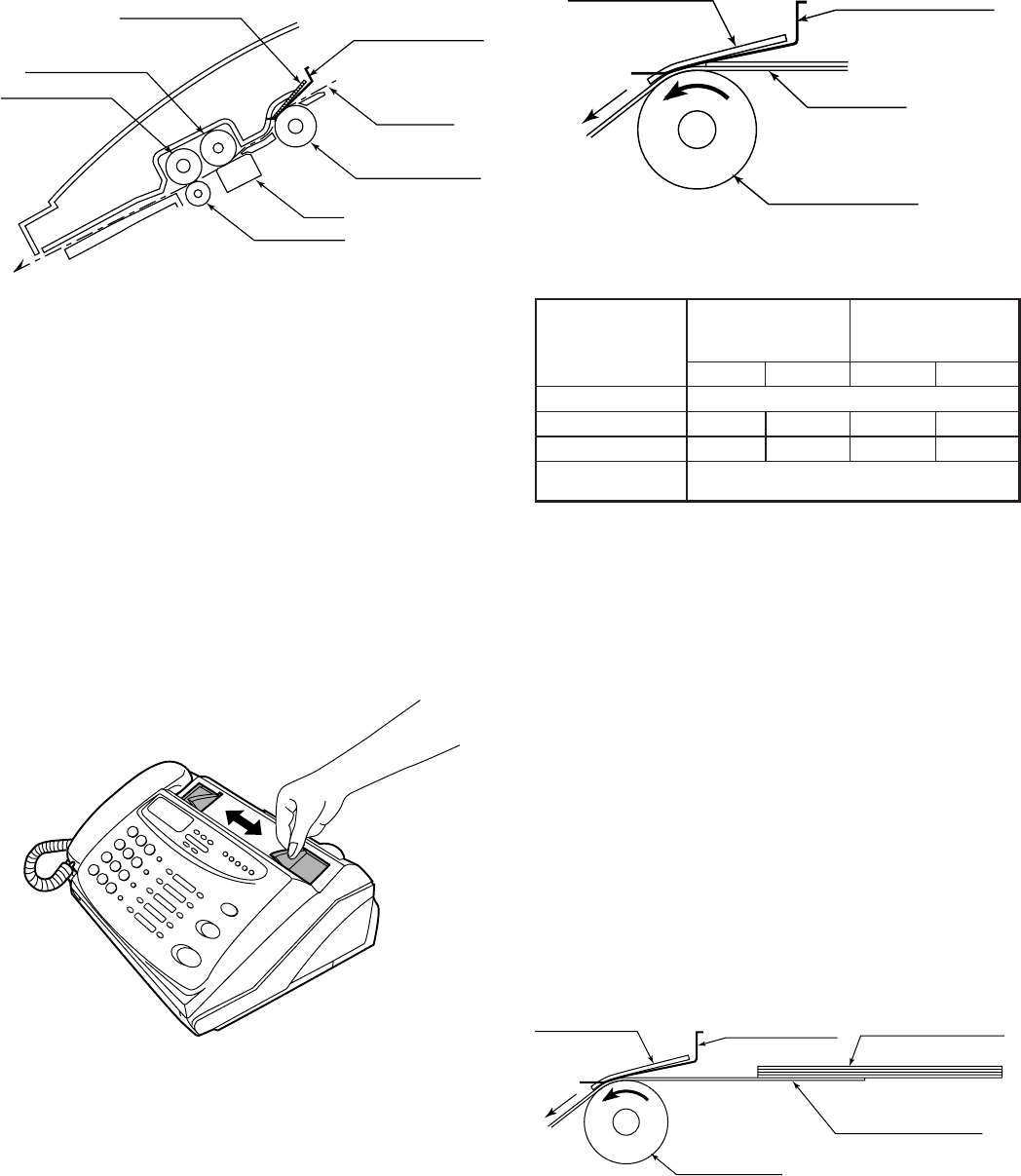
UX-258TH
FO-475TH
CHAPTER 3. MECHANISM BLOCKS
[1] General description
1. Document feed block and diagram
Fig. 1
2. Document feed operation
1) The document placed in the hopper actuates the document sensor.
After one second, the pulse motor starts to drive the paper feed roller.
The document is automatically taken up into the machine, and stopped
at the document sensor.
2) When a specified number of pulses are received from the document
sensor after the document lead edge is sensed, scanning is started.
3) When a specified number of pulses are received from the document
sensor after the document rear edge is sensed, scanning is termi-
nated and the document is fed through.
4) If the document sensor is active (i.e., another document is in the
hopper), when the preceding document scanning is completed and it
is fed out, the next document is taken up into the machine. If the
document sensor is not active (i.e., there is no document in the hop-
per), when the document is fed out, the operation is terminated.
3. Hopper mechanism
3-1. General view
Fig. 2
The hopper is used to align documents with the document guides ad-
justed to the paper width.
NOTE: Adjust the document guide after setting up the document.
3-2. Automatic document feed
1) Use of the paper feed roller and separation rubber plate ensures er-
ror-free transport and separation of documents. The plate spring
presses the document to the paper feed roller to assure smooth feed-
ing of the document.
2) Document separation method: Separation rubber plate
Fig. 3
3-3. Documents applicable for automatic feed
NOTE: Double-side coated documents and documents on facsimile re-
cording paper should be inserted manually. The document feed
quantity may be changed according to the document thickness.
Documents corresponding to a paper weight heavier than 64.3kg (74.3g/
m
2
) and lighter than 135kg (157g/m
2
) are acceptable for manual feed.
Documents heavier than 135kg in terms of the paper weight must be
duplicated on a copier to make it operative in the facsimile.
3-4. Loading the documents
1) Make sure that the documents are of suitable size and thickness, and
free from creases, folds, curls, wet glue, wet ink, clips, staples and
pins.
2) Place documents face down in the hopper.
i) Adjust the document guides to the document size.
ii) Align the top edge of documents and gently place them into the
hopper. The first page under the stack will be taken up by the feed
roller to get ready for transmission.
NOTES: 1) Curled edge of documents, if any, must be straighten
out.
2) Do not load the documents of different sizes and/or
thicknesses together.
3 – 1
Paper size 1/2 Letter (148mm x 140mm) ~
A4 (210mm x 297mm), Letter (216mm x 279mm)
4x6 series
(788mm x 1091mm x
1000mm sheets)
Square
meter series
Minimum Maximum Minimum Maximum
Feeder capacity 10 sheets, max.
Paper thickness (ref.)
0.06mm 0.09mm 0.06mm 0.09mm
Paper weight 45kg 64.3kg 52g/m
2
74.3g/m
2
Fig. 4
Separator rubber
Rear roller A/B
Transfer roller
Pinch roller
CIS
Paper feed roller
Document
Paper feed spring
Separator rubber
Paper feed spring
Document
Paper feed roller
Separator rubber
Paper feed spring
Paper feed roller
Last page of document
First page of document
Back of document


















